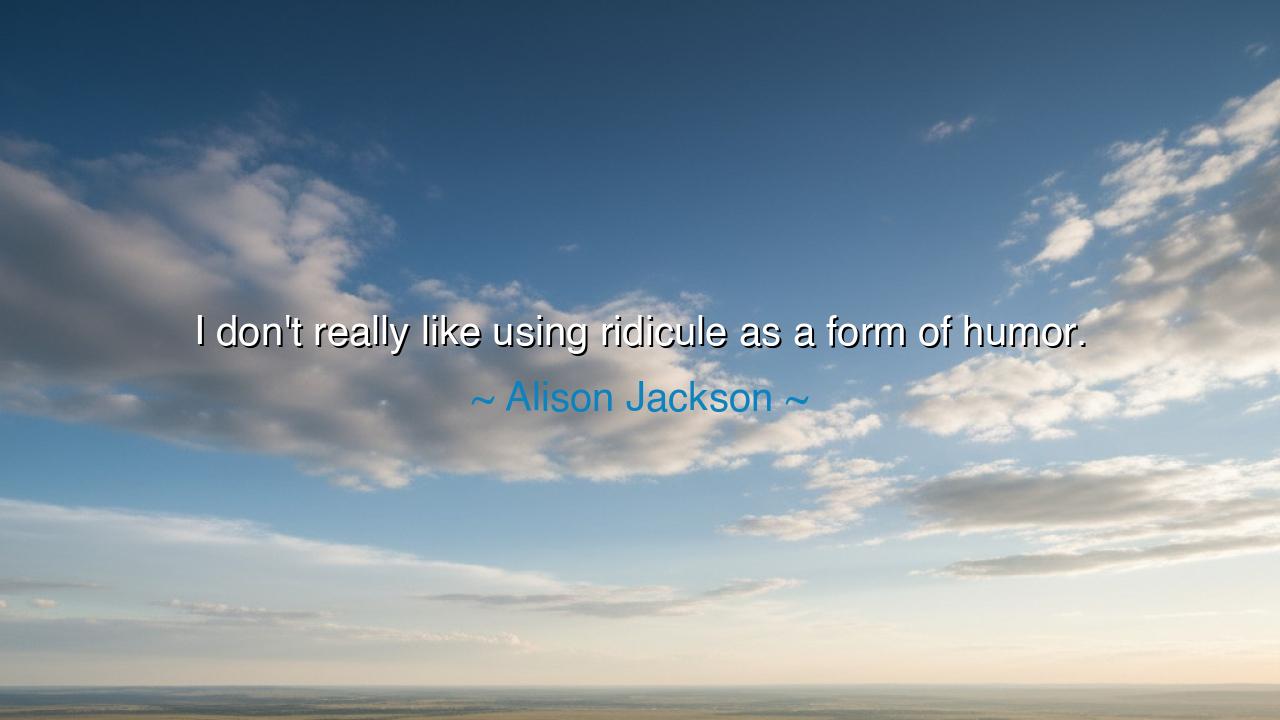
I don't really like using ridicule as a form of humor.






In the words of Alison Jackson, “I don't really like using ridicule as a form of humor.” Though simple at first glance, this declaration holds the depth of a moral ocean. It speaks of kindness, dignity, and the sacred weight of laughter — that divine sound which can heal or destroy, depending on the heart from which it springs. In this saying lies a great truth for all who wield words, for humor, though born of lightness, can carry the sharpness of a blade. To the wise, laughter is not a weapon; it is a bridge that unites souls.
In ancient days, the poets and jesters of courts and villages were given great power — the power to make kings smile and people forget their burdens. Yet not all laughter was holy. Some mocked the weak, the strange, the wounded, and the different. Their ridicule gathered crowds, but it hollowed their own spirits, for cruelty disguised as wit always leaves poison behind. To ridicule another is to lift oneself by pressing another down; it is a false victory, a hollow joy. The ancients knew that the highest humor, like sunlight, illuminates all things without burning them.
Consider the tale of Diogenes the Cynic, who lived in a barrel and mocked the follies of Athens. His wit was sharp, his tongue unyielding — yet even he, amid his biting words, sought to reveal truth, not to humiliate. He used satire to awaken, not to wound. His laughter came not from disdain, but from a desperate love for wisdom. But how many in our time, seeking quick amusement, forget this distinction? They mistake mockery for cleverness, forgetting that cruelty in jest corrupts both speaker and listener. True humor is an act of generosity; false humor is an act of pride.
Alison Jackson, an artist who plays with illusion and perception, understands that laughter can be sacred. Her words reject ridicule because she sees its consequence — the dimming of empathy. When we laugh at others, we close our hearts; when we laugh with others, we open them. This is the difference between humor and mockery, between wisdom and arrogance. The soul that delights in the embarrassment of others grows heavy and small, while the one who finds joy in shared humanity becomes light and vast.
There is a moment recorded in the life of Abraham Lincoln, a man often remembered for both wit and compassion. In his youth, he once wrote a public letter mocking a local politician. The letter brought laughter to many — but deep shame to the one mocked. When Lincoln saw the harm his words had caused, he was pierced with regret. From that day forward, he vowed never again to use his wit as a weapon. His humor became gentle, uplifting, full of humility and self-reflection. And so it was that his laughter bound a wounded nation instead of deepening its wounds.
To reject ridicule is not to reject laughter. It is to honor it — to keep it pure, life-giving, and worthy of the divine breath that shapes it. For laughter is a spark of the eternal; it can banish sorrow, soften anger, and bring the estranged together. But when it grows cruel, it becomes a curse that spreads division. Therefore, the wise must be guardians of their laughter, ensuring it heals and never harms.
Let this lesson be carried forward: let your humor be born of compassion, not contempt. Before you laugh, ask — does this joy bring warmth or wound? Does it rise from love or from scorn? Practice humor that uplifts, humor that humbles yourself before others, humor that remembers the frailty of every soul. In doing so, your words will never be arrows but songs, your laughter never fire but light.
So, to those who follow: speak and laugh as if your words were seeds. Plant them with care, and they shall bloom in hearts long after your voice is gone. For laughter, when shaped by kindness, is the language of angels; but ridicule, when born of cruelty, is the whisper of decay. Choose, then, the higher sound — and let your laughter become a hymn to compassion.






AAdministratorAdministrator
Welcome, honored guests. Please leave a comment, we will respond soon